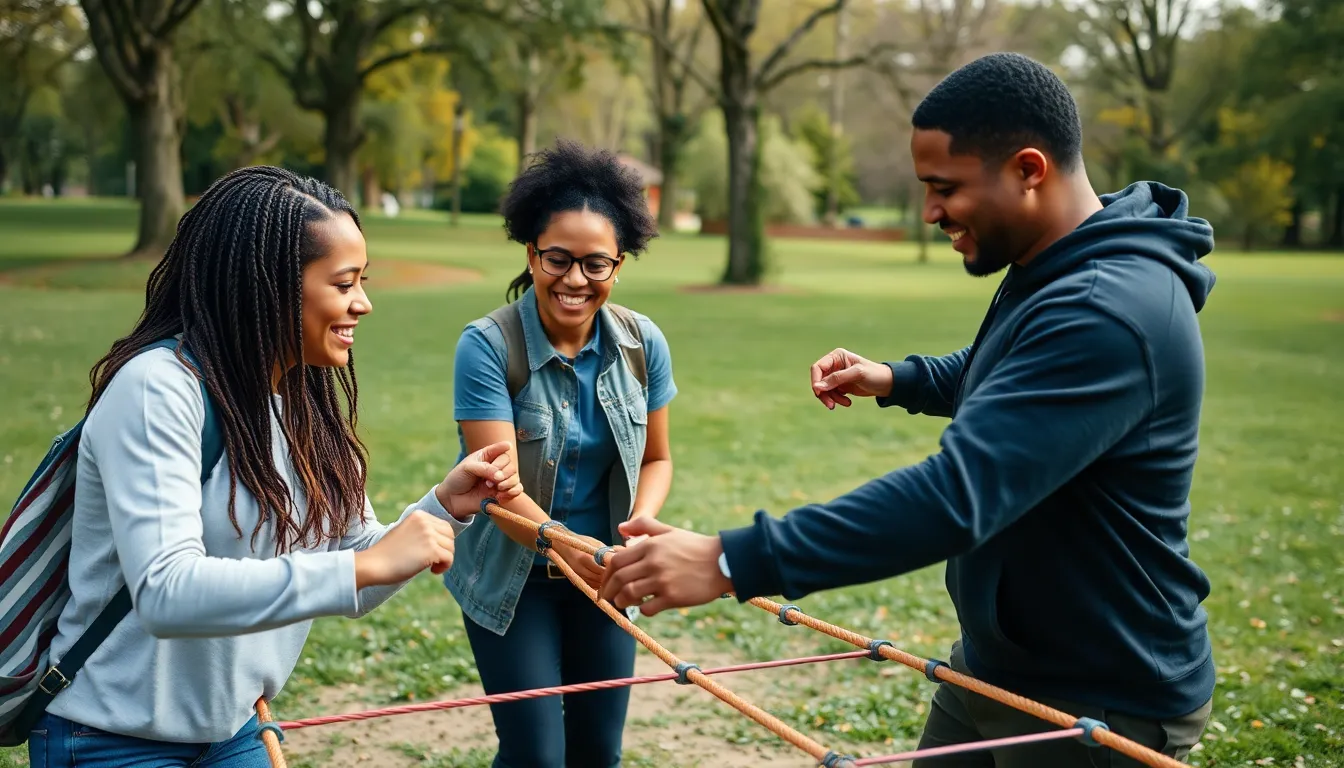Table of Contents
ToggleTrust is the secret sauce that makes relationships thrive, yet it can sometimes feel as elusive as a cat on a hot tin roof. Whether it’s a romantic partnership or a friendship, building trust takes effort, creativity, and a sprinkle of fun. Luckily, trust-building activities can transform awkward moments into opportunities for connection, laughter, and growth.
Imagine playing trust fall with your partner, only to discover they’re not quite ready for that leap of faith. Or perhaps, you’ll bond over a hilarious game of “Two Truths and a Lie” that reveals more than just quirky facts. These activities not only strengthen bonds but also inject a dose of joy into the relationship. Get ready to explore some entertaining ways to boost trust and deepen connections—because who said building trust can’t come with a side of laughter?
Understanding Relationship Trust-Building Activities
Engaging in relationship trust-building activities fosters deeper connections. These activities provide dynamic ways to enhance trust among partners or friends.
Importance of Trust in Relationships
Trust serves as the foundation of any strong relationship. Without it, both romantic partnerships and friendships often struggle. Transparency encourages open communication, which fosters a safe environment. Emotional safety allows individuals to express feelings without fear of judgment. Studies indicate that high trust levels lead to healthier and more satisfying relationships. Trust leads to increased intimacy and resilience during conflicts.
Common Barriers to Trust
Barriers can hinder the development of trust in relationships. One significant barrier includes past betrayals, which can instill doubt. Another barrier involves poor communication; misunderstandings can create distance. Inconsistent behavior from one partner leads to insecurity and erodes trust. Fear of vulnerability often stops individuals from fully opening up. Emotional baggage from previous relationships may contribute to hurdles as well. Recognizing these barriers is essential for taking steps to improve trust.
Types of Relationship Trust-Building Activities

Engaging in diverse trust-building activities strengthens bonds in relationships. Various approaches exist to nurture trust, enhancing openness and connection.
Communication Exercises
Effective communication exercises foster understanding between partners. Practicing active listening allows individuals to focus fully on what the other person conveys. Sharing feelings through structured prompts can clarify thoughts. Setting aside distractions during conversations creates a supportive environment. Periodically discussing relationship goals ensures both partners align their expectations. These exercises enhance empathy and encourage deeper emotional connections.
Team-Building Games
Team-building games encourage cooperation and camaraderie. Activities such as obstacle courses require collaboration while building trust. Playing strategy-based games nurtures problem-solving skills. Engaging in creative tasks builds shared experiences, reinforcing partnership values. Sports activities, regardless of competition, promote teamwork and mutual respect. These games not only entertain but solidify bonds through laughter and shared achievements.
Vulnerability Sharing
Vulnerability sharing strengthens emotional intimacy between partners. Expressing fears, insecurities, and dreams deepens mutual understanding. Partners can create a safe space for sharing by practicing non-judgmental listening. Reflecting on personal experiences reveals common ground and builds empathy. Designating regular times for heartfelt conversations encourages ongoing transparency. This practice allows individuals to connect deeply, cultivating trust over time.
Implementing Trust-Building Activities
Creating the right atmosphere is crucial for trust-building activities. A comfortable setting encourages open conversations and vulnerability. Participants should feel safe and free from distractions. Incorporating elements like soft lighting and comfortable seating enhances a sense of security. Establishing clear boundaries and guidelines fosters respect and promotes honest dialogue.
Choosing the right activities is equally important. Engaging in activities tailored to individual preferences can heighten the effectiveness of trust-building. Consideration of interests and comfort levels ensures participation. Activities like role-playing or cooking together can spark meaningful interactions. Incorporating both structured exercises and spontaneous fun allows flexibility for connection. Balancing the intensity of activities helps maintain a supportive environment throughout the process.
Measuring Success in Trust-Building
Measuring success in trust-building involves recognizing tangible changes in interactions and emotions. Tracking key indicators often proves beneficial.
Indicators of Increased Trust
Observing increased openness during conversations serves as one indicator of improved trust. Partners may initiate discussions about sensitive topics without hesitation. Enhanced emotional support is another sign. Individuals respond to each other’s needs with empathy and understanding. Additionally, greater vulnerability highlights trust development. Sharing personal stories or fears indicates deeper emotional connections. Regular and honest communication also reflects growing trust, as partners engage in meaningful dialogues without fear of judgment. They express concerns and feedback freely, fostering a safe environment.
Feedback Mechanisms
Implementing effective feedback mechanisms allows for ongoing trust assessment. Regular check-ins create space for discussing feelings related to experiences and activities. Partners can ask each other about their comfort levels with various trust-building exercises. Constructive communication fosters mutual understanding and highlights areas for growth. Additionally, journaling or sharing thoughts on experiences promotes reflection. Written feedback enables individuals to articulate feelings that might be difficult to express verbally. Both partners’ willingness to provide and receive feedback enhances accountability, driving continuous improvement in their relationship.
Building trust in relationships is a journey that requires intention and creativity. By engaging in trust-building activities, individuals can foster deeper connections and create a safe environment for open communication. These activities not only break down barriers but also enhance emotional intimacy, allowing partners to share vulnerabilities and dreams.
As trust grows, so does the resilience of the relationship, making it easier to navigate conflicts and challenges. Implementing regular check-ins and feedback mechanisms ensures that trust remains a priority. Ultimately, the effort invested in these activities pays off in stronger, more fulfilling relationships that stand the test of time.







